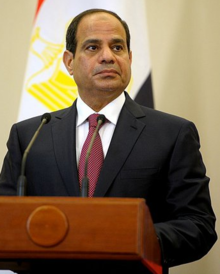Egyptian President
| President of the Arab Republic of Egypt |
|
|---|---|

Presidential Standard
|
|
| Residence | Heliopolis Palace, Cairo, Egypt |
| Term length | Four years renewable once |
| Inaugural holder |
Muhammad Naguib 18 June 1953 |
| Salary | E£504,000 (approx. US$70,400) annually |
| Website | www |
The President of the Arab Republic of Egypt (Arabic: رئيس جمهورية مصر العربية) is the head of state of Egypt. Under the various iterations of the Constitution of Egypt, the president is also the Supreme Commander of the Armed Forces and head of the executive branch of the Egyptian government.
The first president of Egypt was Muhammad Naguib, one of the leaders of the Egyptian Revolution of 1952. He took office on 18 June 1953, the day on which the constitutional monarchy of Egypt was overthrown.
Following the 2011 Egyptian revolution, Hosni Mubarak, who held office from 14 October 1981 until 11 February 2011, was forced to resign following calls for his removal from office. On 10 February 2011 Mubarak transferred presidential powers to then-Vice President Omar Suleiman, briefly making Suleiman de facto president. Following Mubarak's resignation, the position of President of Egypt was officially vacated and the Supreme Council of the Armed Forces, led by Field Marshal Mohamed Hussein Tantawi, assumed executive control of the state. On 30 June 2012, Mohamed Morsi was sworn in as President of Egypt, having won the 2012 Egyptian presidential election on 24 June.
The Egyptian Constitution has had various forms since its 1953 change to become a republic. Under the 1980 amendments of the 1971 Egyptian Constitution, the president of the republic was elected indirectly in a two-stage system unique to Egypt. The People’s Assembly, the lower house of Parliament, nominated one of a number of candidates for presidency. The presidential candidate required at least a two-thirds majority in the People’s Assembly in order to proceed to the second stage of the elections, in which the candidate was confirmed by popular plebiscite.
...
Wikipedia

